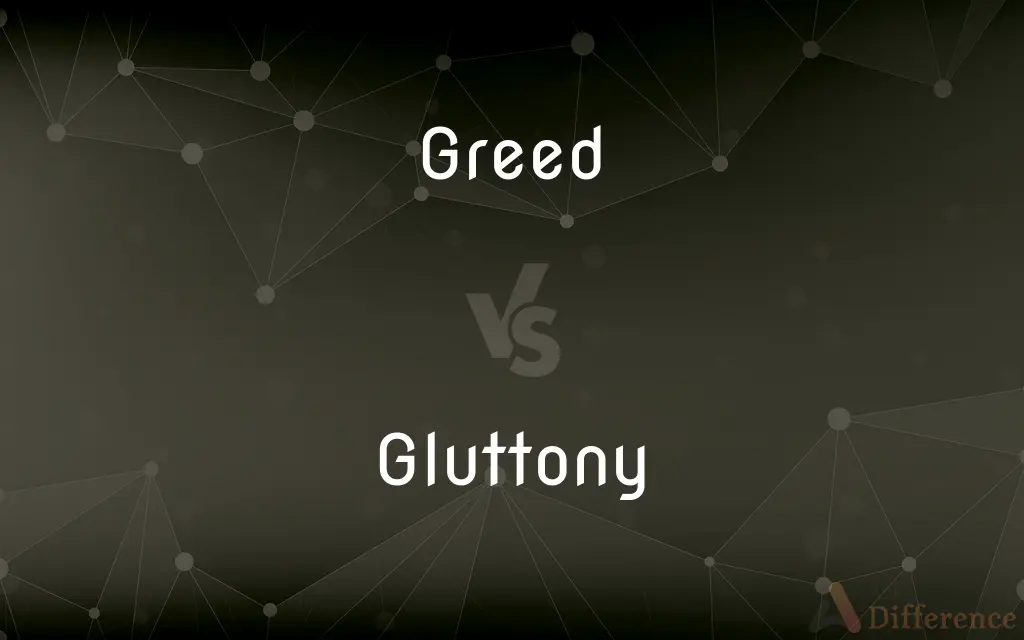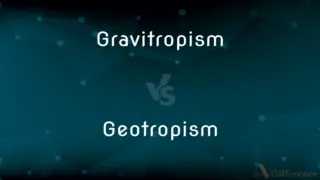Greed vs. Gluttony — What's the Difference?
Edited by Tayyaba Rehman — By Maham Liaqat — Updated on March 7, 2024
Greed is an intense and selfish desire for something, especially wealth, power, or possessions, while gluttony is an excessive or overindulgent desire to consume more food or drink than necessary.

Difference Between Greed and Gluttony
Table of Contents
ADVERTISEMENT
Key Differences
Greed, often regarded as avarice, is a broad desire that can apply to wealth, resources, or status. It involves an insatiable longing for accumulation and possession, extending beyond monetary wealth to include power, influence, and material goods. Gluttony, on the other hand, is specifically related to the excessive consumption of food and drink. It represents an overindulgence to the point of waste, disregarding the physical need and focusing on the pleasure derived from eating or drinking.
Greed is characterized by the pursuit of personal gain at the expense of ethical values and the well-being of others. It manifests in various aspects of life, including business, politics, and personal relationships, where the greedy individual prioritizes their desires over communal needs or fairness. Gluttony can also reflect a lack of self-control and disregard for the consequences of overconsumption, such as health problems and resource depletion. Unlike greed, which is often driven by the desire to accumulate and hoard, gluttony is centered on the act of consumption itself.
While greed is primarily associated with material wealth and possessions, gluttony is confined to the context of consumption. Both, however, denote an excessiveness rooted in desire. Greed may lead to social and economic inequalities, fostering environments where the accumulation of wealth is prioritized over ethical considerations and the welfare of the community. Gluttony, though more personal and physically self-damaging, reflects a similar disregard for moderation and the impact of one's actions on oneself and potentially on others, especially when considering food scarcity and environmental sustainability.
Both greed and gluttony are considered vices in many cultural, religious, and philosophical traditions, often cited as detrimental to personal growth and societal harmony. They illustrate different dimensions of human excess: greed embodies the excessive desire for more in a general sense, while gluttony specifies this excess in terms of consumption.
The distinction between greed and gluttony becomes apparent in their consequences and areas of impact. Greed affects societal structures, contributing to corruption, inequality, and social discord. Gluttony's impact is more personal, affecting physical health and, in broader terms, reflecting on societal issues like waste and resource management. Despite these differences, both share a common theme of excess and the pursuit of satisfaction beyond what is considered necessary or sustainable.
ADVERTISEMENT
Comparison Chart
Definition
Intense desire for wealth, power, or possessions.
Excessive consumption of food or drink.
Focus
Accumulation and possession.
Overindulgence and consumption.
Main Impact
Social and economic inequalities, ethical breaches.
Health issues, resource depletion.
Associated With
Wealth, power, material goods.
Food and drink.
Consequences
Corruption, inequality, social discord.
Health problems, environmental sustainability issues.
Compare with Definitions
Greed
An excessive desire for material wealth.
His greed for money led him to betray his closest friends.
Gluttony
Focuses on pleasure derived from consumption.
His gluttony was evident in his disregard for healthy eating habits.
Greed
Manifests in various life aspects, including business and politics.
Political greed undermines democracy and fairness in society.
Gluttony
Reflects a lack of self-control in dietary habits.
Gluttony is often a struggle for those trying to maintain a balanced diet.
Greed
Can lead to social and economic disparities.
The gap between the rich and the poor is often widened by greed.
Gluttony
Excessive eating or drinking beyond necessity.
The feast was an example of gluttony, with more food than the guests could possibly consume.
Greed
Considered a vice that hampers personal and societal growth.
Overcoming greed is essential for achieving personal satisfaction and societal harmony.
Gluttony
Leads to health problems and potential waste.
Gluttony contributes to obesity and food wastage issues.
Greed
The pursuit of personal gain over communal welfare.
Corporate greed often overlooks the environmental cost of industrial progress.
Gluttony
Raises ethical considerations regarding resource use.
In a world facing food scarcity, gluttony is increasingly seen as an ethical issue.
Greed
Greed (or avarice) is an uncontrolled longing for increase in the acquisition or use of material gain (be it food, money, land, or animate/inanimate possessions); or social value, such as status, or power. Greed has been identified as undesirable throughout known human history because it creates behavior-conflict between personal and social goals.
Gluttony
Gluttony (Latin: gula, derived from the Latin gluttire meaning "to gulp down or swallow") means over-indulgence and over-consumption of food, drink, or wealth items, particularly as status symbols. In Christianity, it is considered a sin if the excessive desire for food causes it to be withheld from the needy.
Greed
Intense and selfish desire for something, especially wealth, power, or food
The colonists' greed for African land
Mercenaries who had allowed greed to overtake their principles
Greed has taken over football
Gluttony
Excess in eating or drinking.
Greed
An excessive desire to acquire or possess more than what one needs or deserves, especially with respect to material wealth
"Many ... attach to competition the stigma of selfish greed" (Henry Fawcett).
Gluttony
The vice of eating to excess.
Greed
A selfish or excessive desire for more than is needed or deserved, especially of money, wealth, food, or other possessions.
His greed was his undoing.
Gluttony
Excess in eating; extravagant indulgence of the appetite for food; voracity.
Their sumptuous gluttonies, and gorgeous feasts.
Greed
To desire in a greedy manner, or to act on such a desire.
Gluttony
Habitual eating to excess
Greed
An eager desire or longing; greediness; as, a greed of gain.
Gluttony
Eating to excess (personified as one of the deadly sins)
Greed
Excessive desire to acquire or possess more (especially more material wealth) than one needs or deserves
Greed
Reprehensible acquisitiveness; insatiable desire for wealth (personified as one of the deadly sins)
Common Curiosities
What drives a person to greed or gluttony?
Both are driven by an excessive desire for more than is needed or sustainable, whether it be material wealth in the case of greed or food and drink in gluttony.
Can greed and gluttony be positive traits?
While ambition and enjoyment of life's pleasures are not inherently negative, greed and gluttony are generally considered vices because they involve excess and disregard for consequences.
Is it possible to overcome greed and gluttony?
Overcoming these vices typically involves cultivating self-awareness, moderation, and a focus on values that prioritize communal well-being and personal health over excessive desires.
How are greed and gluttony treated in religious texts?
Many religions condemn both vices, teaching that they lead to moral decay and distract from spiritual growth and communal responsibilities.
Are there societal implications of greed and gluttony?
Yes, greed can lead to economic disparities and ethical issues, while gluttony can contribute to health epidemics and raise questions about resource allocation and sustainability.
Can greed and gluttony affect mental health?
Yes, both can negatively impact mental health. Greed can lead to perpetual dissatisfaction and stress from never feeling "enough," while gluttony may contribute to guilt, shame, and disorders related to body image and eating.
How do cultures around the world view greed and gluttony?
Cultural perspectives vary, but many cultures view both negatively due to their association with selfishness and wastefulness. Some cultures may emphasize the moral and social consequences of these vices more heavily in their teachings and societal norms.
What role does society play in encouraging or discouraging greed and gluttony?
Society plays a significant role through consumerism, media portrayal of success and happiness, and the availability of resources. Societal values and norms can either mitigate or exacerbate tendencies towards greed and gluttony by valuing moderation and sustainability or by promoting excessive consumption and accumulation.
Are there positive aspects to the desires underlying greed and gluttony?
The desires for achievement, enjoyment, and satisfaction are natural and can be positive when balanced and pursued in a way that considers personal well-being, ethical considerations, and the impact on others and the environment. It's the excess and disregard for these factors that transform these desires into the vices of greed and gluttony.
How do greed and gluttony differ in their impact on relationships?
Greed often damages relationships through betrayal and selfishness, prioritizing material gain over bonds with others. Gluttony primarily affects personal health, but it can also strain relationships if it leads to neglect of shared responsibilities or resources.
Share Your Discovery

Previous Comparison
Gravitropism vs. Geotropism
Next Comparison
Manatee vs. SealAuthor Spotlight
Written by
Maham LiaqatEdited by
Tayyaba RehmanTayyaba Rehman is a distinguished writer, currently serving as a primary contributor to askdifference.com. As a researcher in semantics and etymology, Tayyaba's passion for the complexity of languages and their distinctions has found a perfect home on the platform. Tayyaba delves into the intricacies of language, distinguishing between commonly confused words and phrases, thereby providing clarity for readers worldwide.
















































